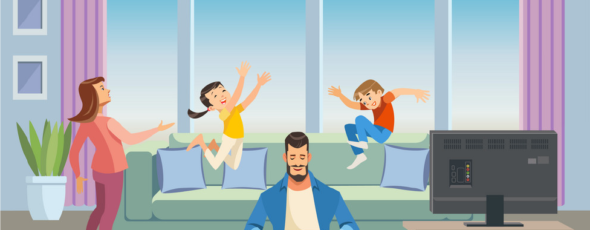
As the world faces the covid-19 pandemic, one of the major challenges is compulsorily working from home. To remain motivated and retain a work-life balance are just two such challenges for research scholars. The lockdown can easily affect one’s productivity and mental health. So, we must plan how best to productively use our time during this lockdown and keep a positive attitude.
There are two aspects to this: academics and psychological well-being.
Academics: what can be done from home?
Except experimental work, a lot of other work can be done from the confines of one’s home, such as:
- Writing your thesis: Plan and begin the writing work for your thesis. Prepare a structure. This is a period when you will have minimal distraction. Use the internet resources and collect/study relevant literature and prepare a strong and thorough literature review. If your results are ready, begin the analysis. At the same time, start noting down the key findings so that a relevant analysis and discussion can be presented.
- Often, one loses focus, resulting in ‘obsession compulsion’ literature collecting. Quite a few interesting, but not so relevant papers exist, and they need to be avoided. Focus on the necessary (and perhaps boring?) ones. One working solution could be to sort the papers in two files: Relevant and Interesting.
- Connecting: Download telecommunication applications like Skype, Slack and Zoom. Connect with your guide, professors, co-workers, and colleagues, and clarify your doubts and queries.
- If you have coursework to complete, prepare for it. Collect resources related to future courses, if any.
Psychological well-being: dressing up
Getting dressed for work contributes to more than merely keeping up one’s appearance, it actually helps in putting our brain in working mode. Dress up as if you are going to college, and you observe that your attention is sharper. Also, a cold shower may uplift your mood and focus.
- Psychological well-being: Planning your day
Structure your day like any other normal day. Strict routine with structure is important for tiding through the quarantine period, beginning with sleep. Oversleeping may affect one’s cognitive function, just as deprivation of sleep can. Keep a routine, but with changes such as different tasks at varying times. Something positive could be done with the time saved from commuting, such as an exercise routine. Do the important tasks when you feel energized the most.
- Psychological well-being: Protecting mental health
A pandemic, in addition to making you anxious and depressed, can make remotely working people vulnerable to mental health issues. Research suggests that they are more likely to undergo higher stress than regular workers. As examples, they may misinterpret emails, allow work to creep into family life, and work much longer. So, switch off your laptop compulsorily at the end of your designated day, carry out pleasurable hobbies for elevating your mood, and, at the onset of anxiety, exercise, read, listen to whatever you enjoy, or catch up with your near and dear.
- Psychological well-being: creating boundaries
Separate your work area from your living area physically, particularly when kids are at home. Even a minimal distraction could affect one’s productivity. Even if there are no kids, you need to isolate from the greatest distraction: the phone. A study at the University of Southern Maine found that when testing complex tasks, the mere presence of the experimenter’s phone (not the participants’) was enough to distract people and lead to lower scores in the test.

Make it difficult for you to play around on another big distraction: social media. While working, this can be detrimental to your productivity. Log out of all accounts. As a habit, shut off all social media notifications while at work and mute all phone notifications.
- Psychological well-being: Sitting by a window
Sit near a window wherever possible, as a view of nature is known to reduce one’s blood pressure and the circulation of stress hormones. Looking at trees or a photograph of scenery on the wall, too, could help.
- Psychological well-being: exercising
Low-intensity activities, too, according to studies, could boost your levels of energy. In addition to health benefits, the sweat and circulation of serotonin, too, can contribute positively to your work.
- Psychological well-being: beating loneliness
In conclusion, since human beings are social animals, loneliness is a threat that should not be taken lightly during a pandemic as it results in poor physical and mental health. Take planned breaks and talk with family and friends (or on the phone if you are isolated) when you are not working.
Here’s hoping that you have a productive and energizing Covid lockdown break!
“Rehoboth Academic Services” is a premium institute supporting PhD & Master’s Thesis since 2013. We offer editing, proofreading, paper preparation, statistical analysis, formatting and plagiarism checking services. We have helped more than 10000+ research scholars in most of the subjects and universities across the globe in the last eleven years. We also conduct Copyediting & Proofreading, Art of thesis writing, Research Paper writing, Statistical Analysis with SPSS Foundation & Advanced workshops. If you need our assistance please call 9731988227, 9741871657.